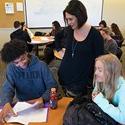解决问题
Problem solving is central to success in any college course. 在他们的学术生涯和生活中, students will encounter problems that need to be solved. These problems may range from the personal (how to pay for college) to the interpersonal (how to work with a partner on a project) to the occupational (how to solve an issue relating to school or work). Although every course requires students to engage in problem-solving, mathematics is a course that students readily associate with the task—the questions written on a whiteboard or on a page are more often than not math problems that need to be solved.
Although problem solving is a task that students engage in throughout their academic careers, they frequently have little experience in the metacognitive process of problem solving. 传统上, students are taught subject-specific tools to apply to a subject-specific problem (example: how to add or how to use a dictionary) rather than problem solving strategies. This results in students who do not understand the process behind problem solving and has a direct impact on student success. Research indicates students who are successful problem solvers are those who are taught how to use and develop metacognitive problem-solving techniques and who engage in the deliberate and reflective process of problem solving (Mason et al.) Problem solving is a multi-step process that students must be taught and must have practice engaging in. Although multiple problem-solving processes exist, 有些比其他的更复杂, most of them include variations of Polya’s four-stepped approach:
- 理解——问题是什么? 目的是什么?? 什么是已知的/未知的?
- planning--How does this connect to prior knowledge? 知识的缺口在哪里? 如何继续?
- 解决——如何执行计划? 在哪里停下来,检查沿途的进展?
- 反思——解决方案是否正确? 我学到了什么??
Students who are not college-ready in math struggle with problem-solving as a process. 经常, they try to answer problems by using subject-specific tools like formulas or equations without stopping to understand the problem and engage in problem-solving. This results in students who frequently fail to arrive at a solution and end feeling defeated and demoralized about their success in math (Yuan 99). Students who are not college-ready in math benefit from being taught stepped problem-solving techniques and strategies, 练习这些步骤, 反思他们的学习. Engaging in this process results in students who are able to make connections and understand the material that they otherwise would not (Yuan 99-104). 学生在 迈向成功 will be taught problem-solving strategies and engage in this metacognitive process. This practice will benefit students in all their courses and will help them develop the necessary readiness skills for their college-level math courses.






